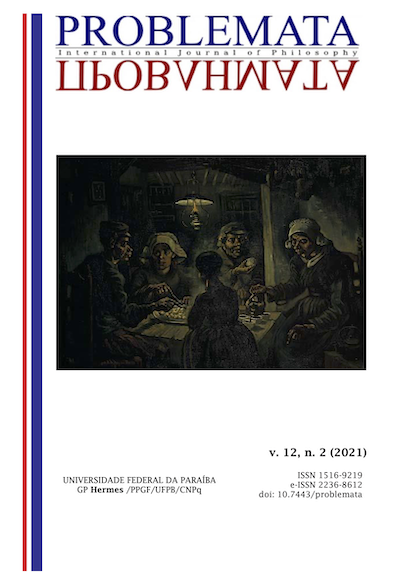CONSIDERATIONS ABOUT NEGATIVE DIALECTIC AND REASON
DOI:
https://doi.org/10.7443/problemata.v12i2.57867Keywords:
Negative Dialectic, Reason, Theodor Adorno, Dialectic, Critical Theory of SocietyAbstract
The work Negative Dialectic (1966) provides an important reflection on the structuring of modern philosophical thought and a conceptual and epistemological legacy fundamental to the understanding of Theodor W. Adorno's thought. Its complex reading raises tensions about the limits of the role of reason and understands the methodological needs of building a dialectic that escapes the absolutizing tendency observed as immanent in the old dialectic. Thus, through a literature review, this article proposes to study the meanings that emerge from the concept of reason in Adorn's Negative Dialectic. Therefore, at first, it demonstrates how the criticism of reason is a constant of the author's thought that is gaining shape and relevance since the Dialectic of Enlightenment, which critically points to the positivist technicality expressed in the so-called instrumental reason, up to radicality of the criticism found in the work Negative Dialectic. Subsequently, it points to the limits of the predominant form of philosophy, materialized in Hegelian dialectics, and the limits of experience within the play of forces between theses and antitheses, highlighting the need to build a philosophy that does violence against itself. It is understood that other forms of structuring thought, such as aphorisms, can reach singular spaces of formative experience foreign to the predominant philosophical thought. Finally, it points to the totalitarianism of traditional dialectics as a fundamental obstacle, forwarding principles of another reason exposed in a Negative Dialectic, which does not aim at dissolving differences and appeasing tensions as a way of resolving thought.
Downloads
References
ADORNO, T. W.; HORKHEIMER, M. Dialética do esclarecimento: fragmentos filosóficos. Trad. Guido Antonio de Almeida. Rio de Janeiro: Jorge Zahar, 1985.
ADORNO, T. W. Teoria da Semiformação, In: Teoria Crítica e Inconformismo: novas perspectivas de pesquisa. Tradução Newton Ramos-de-Oliveira. Campinas, SP. Autores Associados, 2010.
ADORNO, T. W. Dialética Negativa. Rio de Janeiro. Zahar. 2009.
BENJAMIN, W. Sobre arte, técnica, linguagem e política. Tradutores: Maria Luz Moita, Maria Amélia Cruz e Manuel Alberto. Lisboa: Relógio D’água Editores, 1992.
GOMES, L. R. Teoria Crítica e Educação Política em Theodor Adorno. Revista HISTEDBR On-line, Campinas, n.39, p. 286-296, set.2010 - ISSN: 1676-2584
GATTI, L. Exercícios do pensamento: dialética negativa. Novos estud. - CEBRAP, São Paulo, n.85, p.261-270, 2009. Disponível em: <http://www.scielo.br/scielo.php?script=sci_
arttext&pid=S010133002009000300012&lng=en&nrm=iso> Acesso em 14 Abr. 2020.
PUCCI, B. A dialética negativa enquanto metodologia de pesquisa em educação: atualidades. In: Revista e-curriculum, São Paulo, v.8 n.1 ABRIL 2012
PUCCI, B. Walter Benjamin confidente de Adorno e Horkheimer na Dialética do Esclarecimento. In: Comunicações (Piracicaba), Piracicaba, SP, v. 07, n. 02, p. 55-69, 2000.
SCHIPPLING, A. O "não-idêntico " na ideia de razão de Theodor W. Adorno e a resultante possibilidade de uma filosofia fecunda para a Pós-modernidade. In: Revista Filosófica de Coimbra - n." 25 (2004) pp. 129-140.
Downloads
Published
Issue
Section
License
Copyright (c) 2021 MARSIEL PACIFICO

This work is licensed under a Creative Commons Attribution 4.0 International License.
Authors who publish with this journal agree to the following terms:
- Authors retain copyright and grant the journal right of first publication with the work simultaneously licensed under a Creative Commons Attribution License that allows others to share the work with an acknowledgement of the work's authorship and initial publication in this journal.
- Authors are able to enter into separate, additional contractual arrangements for the non-exclusive distribution of the journal's published version of the work (e.g., post it to an institutional repository or publish it in a book), with an acknowledgement of its initial publication in this journal.
-
- Authors are permitted and encouraged to post their work online (e.g., in institutional repositories or on their website) prior to and during the submission process, as it can lead to productive exchanges, as well as earlier and greater citation of published work (See The Effect of Open Access).





